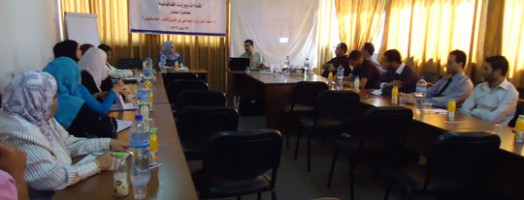Individual and Collective Contract in the Palestinian Labor Law
The Institute of Law - Birzeit University, in cooperation with the German Konrad Adenauer Stiftung, organized a legal encounter on “The Individual and Collective Contract in the Palestinian Labor Law”. The encounter took place on 19 September 2001 and was attended by Mr. Marem Nashwan, Director of Center for Democracy and Workers’ Rights.
Ms. Leena Tunesi, coordinator of the Institute of Law Office in Gaza, inaugurated the meeting by welcoming participants and presenting the different activities organized by the Institute of Law in Gaza. She also explained the legal encounters’ program. The meeting was attended by 27 male and female lawyers from different institutions in the Gaza Strip.
Karim Nashwan started the meeting by introducing the Labor Law and differentiating the public and private laws that regulate labor; he mentioned that the Labor Law aims to regulate relations between employers and employees explaining that the employer is the stronger party in this relation while the weaker link is the worker. The law was thus enacted to protect labors’ rights stating that the labor law defined labor as waged labor, which thus excludes women’s housework or any other unpaid labor.
Mr. Nashwan defined the individual contract stating that it is a non-formal contract since the law does not prescribe that it should be in writing and can therefore be proven by all evidentiary methods. In this regard, he addressed the reasons behind termination of individual labor contract including termination by employer like arbitrary dismissal (termination) or for technical reasons, losses or termination of contract following violations and omissions committed by the worker in question. The contract can also be terminated through resignation of employee.
Then he moved to address the collective contract explaining that it is different from individual contract by being a more formal for a period of three years; it involves employers and workers or their representatives. The information included on the collective contract should include the minimum wages payable for every type of work.
The encounter also involved important questions and interventions by lawyers including ways of proving arbitrary dismissal and compensation for work injuries. The speaker answered the questions and cited examples on methods for calculation of end-of –service allowances (provident fund) and how they are computed in cases of arbitrary dismissal or resignation. In the end of the meeting he thanked the participants on behalf of the Institute of Law and Birzeit University for their active contribution and participation.










